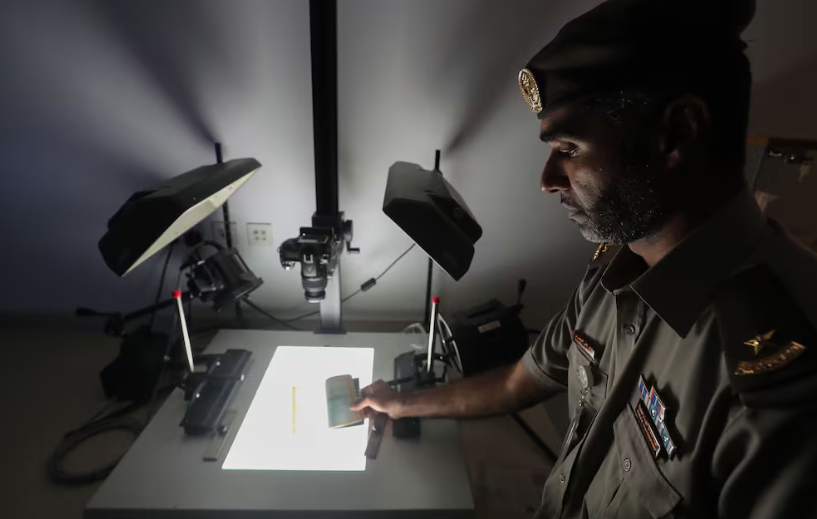What To Know
- If the document requires further examination, the document is forwarded to the Document Examination Centre found in Terminal 1 of the airport dubbed as the “wall to fraudsters”.
- In the first quarter of 2024, a total of 366 passengers were detected to be holding fraudulent travel documents at Dubai International Airport through the assistance of e-readers by the passport control officers.
- The centre employs the use of UV light in order to carry out further identification features such as the fluorescence fibres or ink which may not be ascertainable at the time of retro checks.
In the first quarter of 2024, a total of 366 passengers were detected to be holding fraudulent travel documents at Dubai International Airport through the assistance of e-readers by the passport control officers. Equipped with some of the most advanced tools ever to be used in anti-forgery operations, these officers can easily identify a fake passport in no time.
Retro Check e-passport readers, located in each immigration counter in the Dubai International Airport, enables officers from the General Directorate of Residency and Foreigners Affairs (GDRFA) to ensure that features such as watermarks, microprinting, and colored fibers are integrated in the respective passports. However, if the document requires further examination, the document is forwarded to the Document Examination Centre found in Terminal 1 of the airport dubbed as the “wall to fraudsters”.
Already in the first three months of this year 366 cases of counterfeit passports were exposed, this is 37 cases more than in the same period of the previous year. Out of these, 443 cases were escalated to the Dubai Public Prosecution for any further disciplinary measures to be taken. Illegal entrants are deported to face the consequences of using counterfeit documents and fake passports incidents, both at arrival and transit areas are three times those at the departure.
There are 19 features provided in each passport and they are as follows. The centre employs the use of UV light in order to carry out further identification features such as the fluorescence fibres or ink which may not be ascertainable at the time of retro checks. If it is required, there is a large source of real passport samples from around the world to compare with.
Passport control specialists in Dubai International Airport include around 1,500 Emirati officers for all the terminals due to the high traffic movement in and out of the terminals. Having found the forged documents officers forward it to the police station and in turn to the prosecution. Any discrepancies are inspected by the GDRFA’s Examination Centre and a report is furnished to the Dubai Public Prosecution.
It is much easier to distinguish fake paper passports by the success rate of 80 percent, while the electronic documents are dubious mainly because the chips have been altered. In these cases, there is a necessity to use some advanced technologies. Other handlers are susceptible to gangs in the business of exporting fake passports. For instance, the family spent $10,000 each to acquire the European passports thinking they were legal only for them to be arrested at the transit checkpoint.










